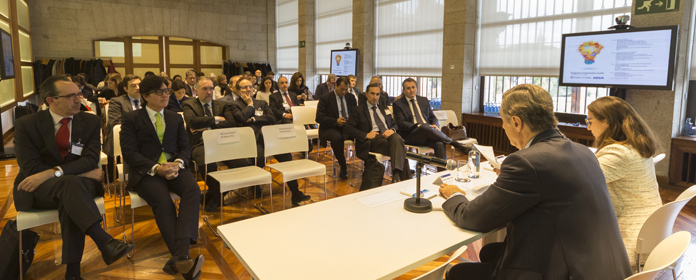Social innovation needs good ideas and committed companies
workshop 49. high school business and Humanism/BBVA: business and social innovation

The high school business and Humanism, and BBVA held on February 1 a workshop on "business and social innovation", which was attended by more than fifty managers, entrepreneurs and university professors. The event took place at the BBVA's Campus in Madrid and is part of the activities that high school will develop this year around the generic topic "Social Innovation". position The two presentations that articulated the workshop were given by Professor Alejandro Ruelas-Gossi, one of the world's leading experts on strategy and innovation, and Antoni Ballabriga, Director Global Business manager of BBVA and a professional with extensive experience in the field of corporate social responsibility and commitment.
In the introduction to the workshop, Ricardo Martí-Fluxá, President of the high school business y Humanismo, focused the topic of the meeting, highlighting the importance of the business, as the most important driver of innovation, in the application of its knowledge and know-how to the improvement of society, as part of the fulfillment of its specific mission statement . María Abascal, Director of Institutional Relations at BBVA, explained how social innovation means taking another step forward in the commitment of companies to social responsibility, something that in a financial institution such as hers takes shape, for example, in fields such as the financial Education of citizens, sustainable finance or the promotion of social entrepreneurship.

Alejandro Ruelas-Gossi, professor at the University of Miami and a well-known expert in strategy and innovation, focused on the importance of companies setting ambitious goals and challenges in order to be able to generate real innovation, including in the area of social innovation. In his opinion, in our times there is very little real innovation, since in the binomial "research and development" there is too much emphasis on development and too little on research. For this reason, as opposed to "doing" and being too much focused on "efficiency" ("race to the bottom"), it is necessary to intensify "thinking" and propose real challenges and improvements for the future ("race to the top"), which move the people in the organization and generate valuable ideas, around which the resources and capabilities of both business and its environment can be orchestrated. In Ruelas-Gossi's opinion, large and ambitious objectives ("moonshoots" or "bold statements") and the orchestration of the best gifts are essential for the success of social innovation projects, which must be valuable for society and profitable for business. Professor Ruelas-Gossi - author of influential academic articles such as Innovation around Obstacles and Strategic Orchestration - recalled in this regard that it should not be forgotten that "financial aid", in its conventional sense, is neither scalable nor sustainable.

Antoni Ballabriga, from his long experience in BBVA's area business manager , and also as a European representative in the UN Sustainable Finance Forum, spoke about the importance of financial institutions placing social innovation at the center of their strategic orientation. To this end, he explained how BBVA had addressed the reconfiguration of the "why" (the bank's purpose and mission statement ), the "what" (the areas of action to have a positive social impact: financial health and technology; extreme transparency; development sustainable) and the "how" (communicate, improve and transform) of its business model manager . Ballabriga also stressed the importance of the social strategy not being a kind of parallel strategy, in a way secondary to the company's business strategy. In this sense, he highlighted how his role - "to think and break comfort zones in the organization"- was especially reinforced by reporting directly to the committee Board of Directors. Lastly, Ballabriga argued that social innovation and action manager in business requires a mindset that gives importance to impact (the aim of transformation), strategy (focus), narrative (the story of the actions being promoted) and kinetics (getting others to do).
Commitment and ideasThe workshop concluded with a round of questions and comments from the audience, and with a section of conclusions at position by Montserrat Herrero, professor of Philosophy politics at the University of Navarra. Professor Herrero highlighted the coincidence of both speakers in establishing social innovation in the purpose, the mission statement and the raison d'être of organizations, in their long-term commitment deadline with the improvement of society. Likewise, some of the most revealing reflections of meeting were the importance of dedicating time to thinking and generating truly innovative ideas; the value of companies thinking "big", looking to the future, when launching social innovation initiatives; the irreplaceable role of people, of the "champions" of social impact and the extension of their Philosophy to the entire organization; and the importance of elevating decision-making on these issues to the highest levels of management, overcoming the mentality that this is an area of activity with a "parallel life" but not integrated into the day-to-day running of business.
